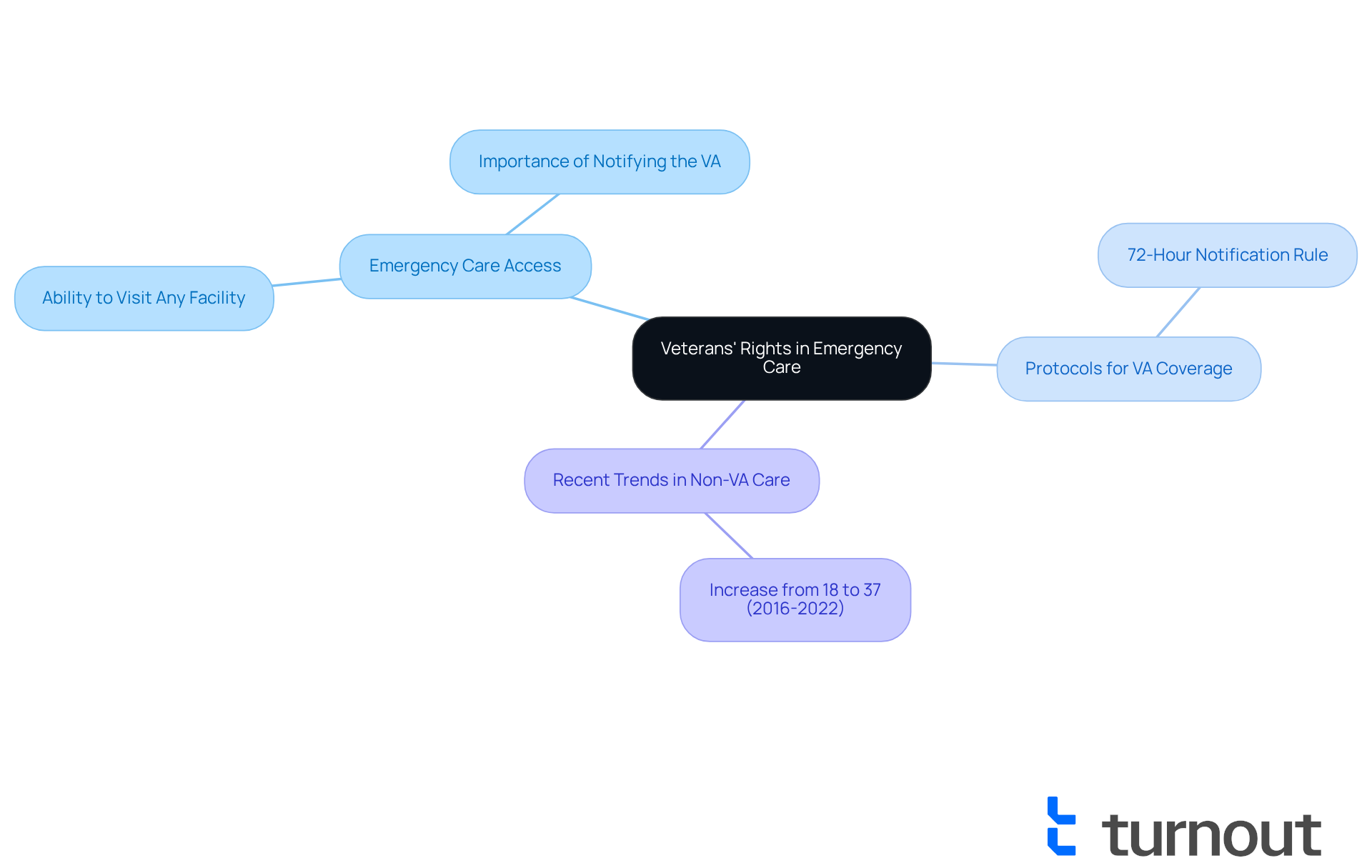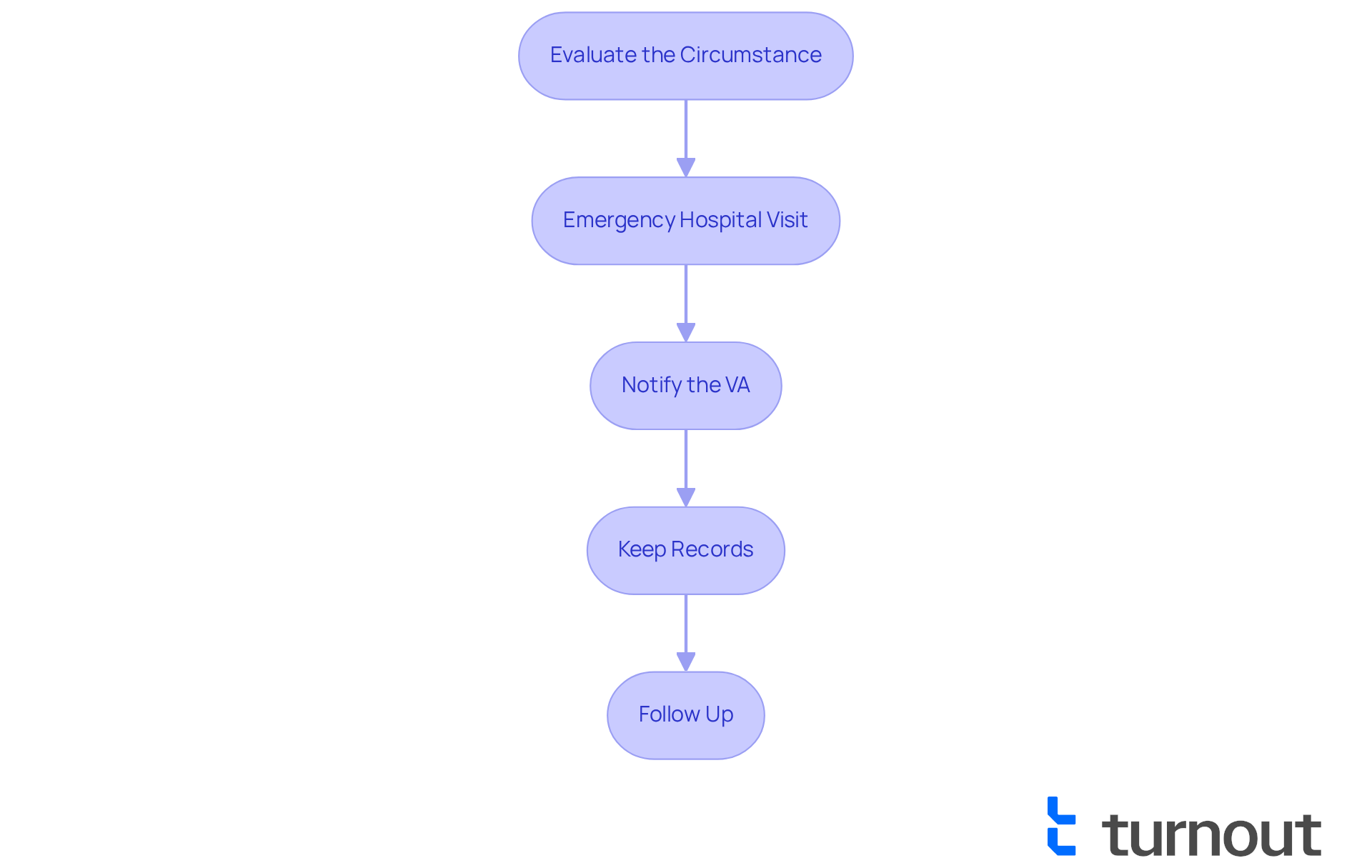Overview
In times of emergency, veterans have the option to seek care at any hospital. However, to ensure that the VA covers these critical services, it's essential to notify the VA within 72 hours of receiving treatment. We understand that navigating the healthcare system can be challenging, especially during urgent situations. That's why it's so important to familiarize yourself with eligibility requirements and the necessary procedures for reimbursement.
Recent trends indicate that more veterans are turning to non-VA facilities for urgent care. This highlights the growing need for awareness and support in accessing these services. Remember, you are not alone in this journey, and we’re here to help you every step of the way. By understanding your options and following the right steps, you can ensure that your care is covered and that you receive the support you deserve.
Introduction
Understanding the complexities of emergency medical care can feel overwhelming, particularly for veterans who may find themselves in urgent situations. With an increasing number of former service members seeking care at non-VA facilities, it is essential to grasp the rights and procedures surrounding emergency healthcare access.
Have you ever wondered what happens when a veteran faces a medical crisis and needs immediate assistance? This article explores the vital steps, eligibility criteria, and financial considerations, ensuring that veterans are equipped to navigate the system and receive the care they deserve—without unnecessary stress.
Understand Your Rights: Accessing Emergency Care as a Veteran
As a veteran, you may wonder, can a veteran go to any hospital in an emergency to seek urgent healthcare, including non-VA hospitals? We understand that facing a medical crisis can be overwhelming, and the VA encourages you to pursue prompt assistance without hesitation. While you can visit any urgent treatment facility, it's crucial to follow specific protocols to ensure your assistance is covered by the VA, particularly regarding whether a veteran can go to any hospital in an emergency. This means informing the VA within 72 hours of receiving care, which allows for reimbursement and coverage of your treatment. Familiarizing yourself with the VA's regulations regarding urgent situations is crucial, so you are prepared in case of a crisis.
Recent research reveals a significant trend: the percentage of former service members seeking urgent care at non-VA facilities has risen from 18% in fiscal year 2016 to 37% in fiscal year 2022. This shift underscores the importance of understanding your rights and the steps involved in obtaining assistance. VA representatives emphasize that telehealth services enable former service members to evaluate potential crises from the comfort of their homes. This offers a practical alternative to in-person appointments, particularly for those in remote areas or facing mobility challenges. Furthermore, the VA has implemented strategies to improve the availability of urgent services, ensuring that veterans can access timely and appropriate assistance when needed.

Determine Eligibility for Emergency Medical Care Under VA Guidelines
If you’re seeking urgent medical assistance under VA guidelines, it’s important to understand whether a veteran can go to any hospital in an emergency and the criteria that must be fulfilled. First and foremost, you need to be enrolled in the VA health services system and have received treatment at a VA facility within the last 24 months. The urgent assistance you request should either relate to a service-related condition or pose a significant risk to your health.
Moreover, the VA is here to help with emergency medical treatment if your condition is service-related or if services are unavailable at a VA facility. As of January 2024, over 9 million veterans are expected to be enrolled in the VA health services system, which underscores the importance of knowing these eligibility requirements.
If you have any questions about your eligibility, we encourage you to reach out to your local VA office or visit the VA website for comprehensive information. Remember, you can also contact the Veterans Crisis Line for immediate support. By understanding these guidelines, you can navigate the system more effectively and obtain the assistance you need. You are not alone in this journey, and we’re here to help you every step of the way.

Follow Essential Steps for Seeking Emergency Care: A Veteran's Guide
When you find yourself in need of emergency care, it's essential to follow these crucial steps:
- Evaluate the Circumstance: If you are facing a medical crisis, please do not hesitate to call 911 or visit the nearest urgent care facility. Your health comes first.
- If urgent assistance is needed, can a veteran go to any hospital in an emergency without requiring prior approval from the VA? This flexibility is vital, especially in urgent situations where time is of the essence.
- Notify the VA: After receiving care, it’s important to contact the VA within 72 hours of the start of your treatment. This notification is key to ensuring reimbursement and coverage for your urgent services. Recent legislation has even proposed extending this notification requirement to 72 hours after discharge, providing veterans with more time to inform the VA and easing the stress of navigating bureaucracy during recovery.
- Keep Records: Make sure to preserve all health-related documents and invoices connected to your urgent treatment. This documentation is necessary for the VA to process your claim effectively. Veterans have faced significant surprise medical bills totaling thousands of dollars due to not notifying the VA within the required timeframe, so maintaining thorough records is critical.
- Follow Up: After your urgent visit, please connect with your VA healthcare provider to discuss any ongoing treatment or support you may require. This guarantees continuity of care and addresses any additional health issues you may face.
By following these steps, you can navigate the intricacies of urgent assistance and determine if a veteran can go to any hospital in an emergency with greater ease, reducing the likelihood of unforeseen expenses and ensuring you receive the benefits you deserve. Remember, we’re here to help, and you are not alone in this journey.

Navigate Financial Considerations: VA Payments and Emergency Care Costs
Navigating the financial aspects of urgent assistance can feel overwhelming. We understand that seeking help during such times is challenging. At Turnout, we are here to simplify your access to government benefits and financial support. Here are some key points to consider:
- VA Coverage: The VA may cover the costs of emergency care if it relates to a service-connected condition. It's crucial to notify the VA within the required timeframe to facilitate payment. This step can significantly impact your financial responsibility.
- Out-of-Pocket Costs: For non-service-connected conditions, you may face out-of-pocket expenses. Understanding your coverage is essential to prepare financially. The VA's new reimbursement regulations state that while they will cover coinsurance for urgent medical situations if a claim is submitted within one year, copayments and deductibles are not eligible for reimbursement.
- Reimbursement Procedure: If you pay for urgent medical services upfront, you can file a claim with the VA for reimbursement. Be sure to keep all receipts and documentation to support your claim. Recent judicial decisions have strengthened former service members' rights to compensation for urgent medical treatment. This may require the VA to disburse hundreds of thousands of dollars each year for these claims. Importantly, individuals who have never submitted a request can lodge a new application by February 22, 2024, giving them another opportunity to pursue reimbursement for their non-VA urgent services.
- Consult Financial Advisors: If you have concerns about costs, consider reaching out to a financial advisor who specializes in veteran benefits. They can guide you in navigating your options and maximizing your benefits. Financial experts emphasize the importance of understanding your coverage and planning for potential out-of-pocket expenses. Turnout can assist you in connecting with the right resources, including support for Social Security Disability claims and tax debt relief, to ensure you make informed decisions.
An example of VA coverage is when the VA can pay for emergency medical care if the condition is service-related or if care isn't available at a VA facility, leading to the question of can a veteran go to any hospital in an emergency. For instance, if you experience a life-threatening condition and ask, can a veteran go to any hospital in an emergency, the VA may cover the associated costs at a non-VA hospital, provided you meet the necessary criteria.
Remember, you are not alone in this journey. We are here to help you every step of the way.

Conclusion
Understanding your rights and the procedures surrounding emergency medical care is essential for veterans like you. The ability to access any hospital during an emergency can significantly impact your health outcomes and financial responsibilities. By knowing the necessary steps to take, you can ensure that you receive timely assistance while navigating the complexities of VA coverage and reimbursement.
This guide has highlighted critical aspects of emergency care access for veterans, including:
- Eligibility requirements
- The importance of timely notification to the VA
- The financial implications of seeking care at non-VA facilities
Remember, it's vital to be proactive in understanding your rights and the procedures involved in securing the benefits you deserve. With the rising trend of veterans utilizing non-VA urgent care, being informed is more crucial than ever.
Ultimately, the message is clear: you should never hesitate to seek emergency care when needed. By following the outlined steps and staying informed about your rights, you can navigate the healthcare system effectively. It is essential to reach out for help, whether through local VA offices or financial advisors, to ensure that you receive the care and support you require. The journey may seem daunting, but remember, you are not alone in this. Resources are available to assist you every step of the way.
Frequently Asked Questions
Can a veteran go to any hospital in an emergency for urgent healthcare?
Yes, a veteran can visit any urgent treatment facility, including non-VA hospitals, in case of an emergency.
What should a veteran do after receiving emergency care at a non-VA facility?
The veteran must inform the VA within 72 hours of receiving care to ensure reimbursement and coverage of the treatment.
Why is it important for veterans to understand the VA's regulations regarding urgent situations?
Familiarizing oneself with the VA's regulations is crucial so that veterans are prepared and know the steps to take in case of a medical crisis.
What trend has been observed regarding veterans seeking urgent care at non-VA facilities?
The percentage of former service members seeking urgent care at non-VA facilities has increased from 18% in fiscal year 2016 to 37% in fiscal year 2022.
How can telehealth services benefit veterans in crisis situations?
Telehealth services allow veterans to evaluate potential crises from home, providing a practical alternative to in-person appointments, especially for those in remote areas or with mobility challenges.
What steps has the VA taken to improve access to urgent services for veterans?
The VA has implemented strategies to enhance the availability of urgent services, ensuring veterans can access timely and appropriate assistance when needed.




